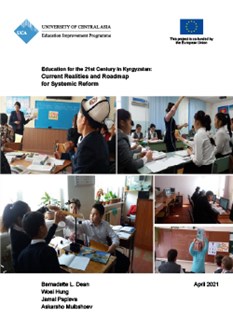Education for the 21st Century in Kyrgyzstan: Current Realities and Roadmap for Systemic Reform
Kyrgyzstan has undertaken several educational reforms to prepare young people with the competencies needed for success in their personal, professional and civic life in the 21st century and thereby make the country regionally and globally competitive.
State education standards and subject curricula have been developed using a competence-based pedagogical approach. They aim to develop students critical and creative thinking, communication, collaboration, connectivity for learning, character qualities, citizenship and cultural pluralism through the core subjects. Whereas little attention has been paid to pre-service teachers, in-service teachers have been provided training to deliver the curriculum. How well-prepared do STEM, ICT and English teachers feel they are to deliver the competence-based curricula? What resources are available to them? What are their educational and subject beliefs? What are their current teaching and learning practices? What are student learning strategies and how well are they performing? What are teachers continuing professional development needs and how best can they be met?
This report presents findings from a comprehensive situational analysis conducted in 20 general secondary schools across Kyrgyzstan. Using a mixed methods research design, data was collected from 112 teachers, 382 students, 20 school directors and 141 parents through questionnaires and interviews. The standard and curricula were analysed and 108 lessons in mathematics, the natural sciences, computer science and English were observed.
The findings show lessons are largely teacher-centered, textbook-based and focused on developing students’ subject knowledge. There is a severe inadequacy of human and physical resources. Even textbooks are not available for all students! Students spend considerable time memorizing content rather than ‘deep learning’. They have high motivation to learn and high educational and career expectations. Teachers want professional development to: enhance their subject and pedagogical knowledge and understanding, learn how to develop students’ cross curricula skills, embed ICT in teaching and learning, make effective use of formative assessment and design summative assessments that provide students the opportunity to apply their learning to real-world situations. Recommendations for the Ministry of Education, pre- and in-service teacher education institutions, school directors and teachers are presented.








